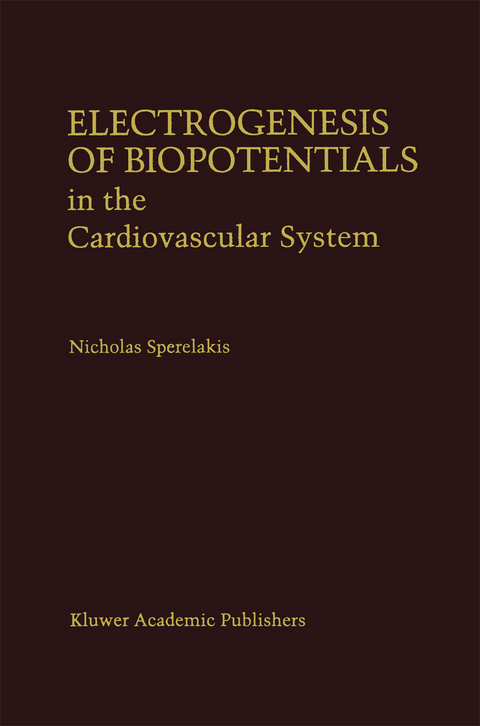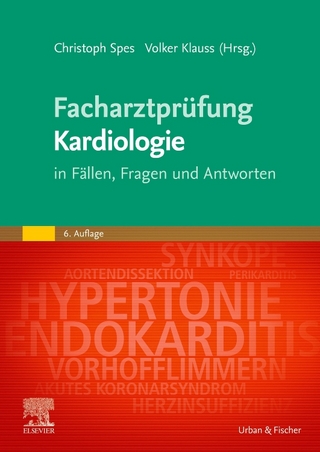
Electrogenesis of Biopotentials in the Cardiovascular System
Springer (Verlag)
978-0-7923-3398-2 (ISBN)
There has long been a need for a text which precisely defines the assumptions underlying the derivations and equations that describe the principles of electrical excitability and maintenance of ion gradients in excitable cells. Here, Professor Sperelakis not only defines the equations and underlying concepts of membrane potentials, but gives working examples of solutions, thus allowing investigators to utilize the fundamental principles in their research, and students of membrane physiology to establish a sound basis of electrophysiological theory.
`I have used the `Origin of the Cardiac Resting Potential' in graduate courses on cell physiology and biophysics, and look forward to using this new book. The time and effort required to put this work together reflects the dedication of Dr Sperelakis to the field of membrane biophysics and electrophysiology in his long, productive career.'
From the Foreword by Dr David R. Harder.
Chapt. I Membranes and Electricity.- A. Introduction and Historical Aspects.- B. External Recording and Intracellular Recording.- C. The Cell Membrane.- Appendix I: Review of Electricity and Cable Parameters.- Chapt. II Ion Distributions and Ion Pumps.- A. Introduction to Ion Distributions.- B. Na+ and K+ Distributions.- C. Cl?Distribution.- D. Ca2+ Distribution, Exchange, and Pumping.- E. Energetics of Pumping.- F. (Na-K)-ATPase Pump.- Chapt. III Ca2+/Na+ Exchange Reaction.- A. Energetic Considerations.- B. Ratio of Free Energy Changes.- C. Electrogenic Na/Ca Exchange Current Measurement.- Appendix III: Derivation of Ca/Na Exchange Distribution Ratio.- Chapt. IV Diffusion and Permeability.- A. Diffusion and Diffusion Coefficient.- B. Permeability Coefficient.- C. Ussing Flux Ratio Equation.- Appendix IV: Diffusion.- Chapt. V Concentration Cells and Equilibrium Potentials.- Appendix V: Derivation of Nernst Equation.- Chapt. VI Determination of Resting Potential.- A. Modified Nernst Equation.- B. Constant Field Equation.- C. Chord Conductance Equation.- D. Resting Potential as Function of [K]o.- Appendix VI-A: Constant Field Equation.- Appendix VI-B: Derivation of Chord Conductance Equation.- Appendix VI-C: Circuit Analysis for Cell Membrane.- Appendix VI-D: Permeability Coefficient Determination.- Appendix VI-E: Half-Cell Potentials.- Chapt. VII Electrochemical Driving Forces and Membrane Ionic Currents.- A. Current Equations.- B. Automaticity.- C. Electrical Equivalent Circuit of Cell Membrane.- Chapt. VIII Surface Charge, Stable States, and Osmotic Effects.- A. Potential Profile Across Membrane.- B. Multiple Stable States of Membrane Potential.- C. Osmotic Effects.- D. K+ Effects.- E. pH Effects.- Appendix VIII: Theoretical Velocity as a Function of Tonicity in aCable.- Chapt. IX Electrogenic Sodium Pump Potentials.- A. Na+ Loading for Pump Stimulation.- B. Density, Turnover Number, and Pump Current.- C. Model and Equivalent Circuit.- D. Physiological Importance.- E. Measurement of Electrogenic Na-K Pump Current.- Appendix IX: Electrogenic Pump Potential.- Chapt. X Developmental Changes in K+ Permeability.- Chapt. XI Gibbs-Donnan Potentials.- Chapt. XII Effect of Resting Potential on Rate of Rise of Action Potential.- Chapt. XIII Cable Properties and Propagation.- A. Introduction.- B. Biological Fiber as a Cable.- C. Length Constant.- D. Time Constant.- E. Local Potentials.- F. Local-Circuit Currents.- G. Factors Affecting Propagation Velocity.- H. Saltatory Conduction.- I. Wavelength of the Impulse.- J. External Recording of Action Potentials.- K. Compound Action Potential.- L. Summary.- Chapt. XIV Summary.- References.
| Reihe/Serie | Developments in Cardiovascular Medicine ; 164 |
|---|---|
| Zusatzinfo | XXII, 364 p. |
| Verlagsort | Dordrecht |
| Sprache | englisch |
| Maße | 155 x 235 mm |
| Themenwelt | Medizinische Fachgebiete ► Innere Medizin ► Kardiologie / Angiologie |
| Studium ► 1. Studienabschnitt (Vorklinik) ► Physiologie | |
| Naturwissenschaften ► Biologie ► Humanbiologie | |
| ISBN-10 | 0-7923-3398-5 / 0792333985 |
| ISBN-13 | 978-0-7923-3398-2 / 9780792333982 |
| Zustand | Neuware |
| Informationen gemäß Produktsicherheitsverordnung (GPSR) | |
| Haben Sie eine Frage zum Produkt? |
aus dem Bereich


